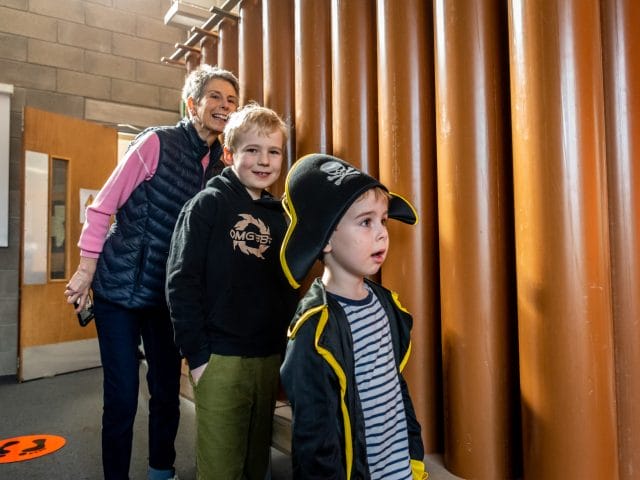Read our Q&A with Mental Health First Aiders to find out more about their role at WMC!
The 10th of October is World Mental Health Day, which is a global initiative to raise awareness and support for mental health issues. 2024’s theme – set by the World Federation of Mental Health – is workplace mental health, highlighting its importance for the benefit of people, organisations and communities. We’re lucky to have three members of staff who are also trained Mental Health First Aiders (MHFA). Read on to find out who they are and what they do.
Meet Cassie Tait (centre), Acting Co-Chief Executive and Head of Creative Learning & Commuity Engagement:
How long have you been a Mental Health First Aider (MHFA)?
18 months.
What does being a MHFA actually involve/mean?
You are there, much like a physical first aider, to support people who are experiencing poor mental health at work.
Why do you think having a MHFA is important in the workplace?
We all experience mental health challenges, and as first aiders, we can signpost to support and help our team stay healthy.
What are your top tips for mental health wellness at work?
Everyone has their own work patterns and ways to stay healthy, but making sure your getting desk breaks is a winner. 15 mins a day to take a quick walk or do a quick tea round, can help. There are lots of other tips on the MHFA and Mind websites.
How can others become MHFAs?
We received our training from the brilliant Tracey Sullivan at Open Minds Mental Health. She also trained our whole team through the half day Mental Health Awareness course too, which we can’t recommend enough.
Why are you a MHFA and what is rewarding about it?
Mental health is as important as physical health, and we can all take steps to stay healthy. It’s rewarding to be able to give time and support to the team, and to keep us talking openly about mental health as a part of life.
Meet Arianne Fournier-Carey (right), Operations Manager:
How long have you been a Mental Health First Aider?
18 months.
What does being a MHFA actually involve/mean?
A Mental Health First Aider is trained to spot signs of mental health struggles and offer support, much like a physical first aider. They listen, provide reassurance, and guide the person toward professional help or resources if needed. They’re there to help in a kind, non-judgmental way when someone’s feeling overwhelmed.
Why do you think having a MHFA is important in the workplace?
A Mental Health First Aider is important at work because they can spot early signs of mental health struggles, provide someone to talk to, and guide colleagues to get the right help. They help create a more supportive and caring workplace where people feel comfortable talking about their mental well-being.
What are your top tips for mental health wellness at work?
Take Breaks: Step away from your desk regularly to recharge and move your body.
Stay Connected: Chat with colleagues to build a supportive community.
Set Boundaries: Balance work and personal life by saying no when needed.
Practice Mindfulness: Try deep breathing or meditation to reduce stress and do simple stretches to relax your body.
Seek Support: Don’t hesitate to ask for help if you’re feeling overwhelmed.
These simple steps can really boost your well-being at work!
Why are you a MHFA and what is rewarding about it?
I became a Mental Health First Aider (MHFA) because I’m passionate about supporting others and promoting mental well-being. It’s rewarding to be able to make a difference in someone’s life, whether it’s by listening, offering guidance, or helping them find the resources they need. Knowing that I can help create a more supportive and understanding environment makes the role truly fulfilling. It’s incredibly gratifying to see someone feel heard and supported, and to help create to a culture that prioritises mental health.
Meet Gill Fox (left), Volunteer Coordinator & Senior Concert Manager:
How long have you been an MHFA?
Almost 3 years.
What does it actually involve/mean?
Being there! It is important be sensitive to the needs of others (in my case, principally, but not exclusively, volunteers). It is being known as a trained point of contact to be called upon, but it’s also important to use training sensitively to spot a potential issue and to be gently proactive.
Why is having an MHFA important?
We’ll all have moments of stress/crisis/distress at some point, so it’s important that there are people with trained insight who are able to provide support at an early stage.
What are your tips for mental health wellness at work?
If you should feel overwhelmed or daunted, know that saying so/asking for support/standing back is okay.
Take full advantage of being part of the brilliant (volunteer) team – join in with social activities, chat and share with your fellow stewards and with CMs when you’re in for a concert.
Balance your enthusiasm to commit with realism! If you need to withdraw from a shift, don’t worry about saying so.
Remember that you are truly valued – reflect on this when you need a boost. And if things are going deeper/getting tougher, know that signposting to further support is available to you.
Why are you an MHFA/what is rewarding?
It’s a privilege to be a trained MHFA, and to have the wherewithal to support volunteers/colleagues when the going has got tough. And it’s also rewarding to be working at creating/maintaining an environment which nurtures mental wellbeing. It’s very special to be able to show people that they are valued and heard, and to watch them blossom in a caring environment. As with medical First Aid, the skills learned and practiced are relevant and useful well beyond WMC.





